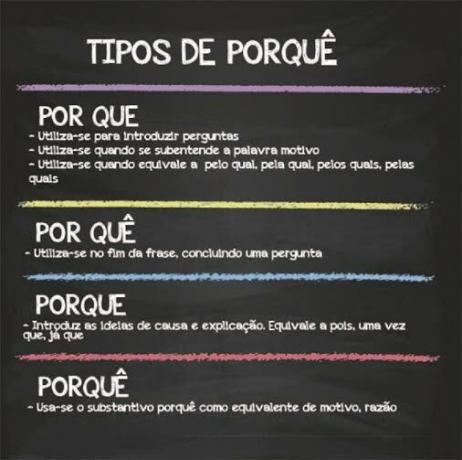Perhaps, in the Portuguese language, there is no doubt that more afflicts speakers than the use of pors. Be sure that knowing how to use whys is a difficult task for most people, considering that there are several types, as well as different situations in which they are used. Escola Educação prepared an easy tip for you to eliminate all your doubts and learn once and for all the differences between why, why, why and why. Let's go? Good reading!
1. The shape WHY is used:
see more
Teacher performance is a key factor for the full inclusion of students…
Financial education is the best ‘medicine’ for chronic indebtedness…
a) To enter a question. Examples:
Why you didn't talk to me when you entered the classroom?
Why Didn't you go to the school graduation party?
Why the sky is blue?
b) When the word motive is implied. Examples:
I don't know how to tell you why I thought about it now!
You already know why Is it that you have so many grammatical doubts?
c) When is equivalent to by which, by which, by which, by which. Examples:
I can't understand the reason why she left here crying.
2. The shape WHY, with a circumflex accent, appears at the end of the sentence, concluding a question. Examples:
Laughing why?
Scared? Why?
3. The word WHY introduces the ideas of cause and explanation. Equivalent to because, since, since. Examples:
I will not respond to your offenses why I am not obliged.
I will not travel why I'm not on vacation yet.
he decided to leave why received an urgent phone call.
I can't pay my debts why I still haven't received it.
4. the noun is used WHY as equivalent of motive, reason. Examples:
I don't understand the why with so much sadness.
there must be a why in Carlos' desperate attitude.

Did you see? It's not even that complicated! Whenever you are struggling with the use of whys, check out our explanation and avoid mistakes! Good studies!
Luana Alves
Graduated in Letters